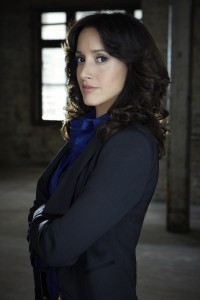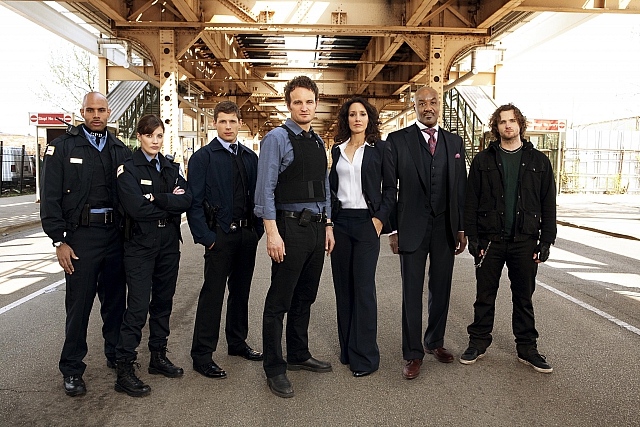 Superintendent of Police is a very important and powerful position for a woman. On Fox’s new show The Chicago Code, premiering February 7, Jennifer Beals known for her iconic roles in the 1983 film, Flashdance and The L Word, steps up to the challenges as the first female Superintendent of Police to rid the city of Chicago of corruption.
Superintendent of Police is a very important and powerful position for a woman. On Fox’s new show The Chicago Code, premiering February 7, Jennifer Beals known for her iconic roles in the 1983 film, Flashdance and The L Word, steps up to the challenges as the first female Superintendent of Police to rid the city of Chicago of corruption.
THE CHICAGO POLICE DEPARTMENT SETS OUT TO BRING DOWN AN EMPIRE OF CORRUPTION ON THE SERIES PREMIERE OF “THE CHICAGO CODE”
MONDAY, FEBRUARY 7, ON FOX
New Drama Series from Acclaimed Creator Shawn Ryan (“The Shield”)
In the series premiere episode, Teresa Colvin, the city’s first female superintendent, lobbies for a city corruption task force to investigate Alderman Ronin Gibbons, a building-magnate-turned-politician. Meanwhile, Colvin’s ex-partner and larger-than-life veteran of the Chicago Police Department, Jarek Wysocki, investigates a suspicious murder in Grant Park alongside his new partner Caleb Evers. Also in Jarek’s charge are his niece, Vonda Wysocki; her hotshot partner, Isaac Joiner; and Liam Hennessey, an Irish thug who blends in with the gritty world of local crime. Together, these cops stop at nothing to navigate the Windy City’s underbelly to fight crime and bring down Alderman Gibbons’ empire of corruption in the “Pilot” episode of THE CHICAGO CODE airing Monday, Feb. 7 (9:00-10:00 PM ET/PT) on FOX. (CHI-101) (TV-TBA)
Superintendent of the police is a very important and powerful position for a woman. Do you feel you were up to the challenges of the role and were there any reservations when you first received the script?
Jennifer Beals: It’s a very interesting position to be a woman who’s in charge of a department or several bureaus who are primarily men and even to ascend to the point where she’s even been nominated for the position because certainly she doesn’t get—I don’t think anybody intended for her to initially have this position. There were two other men, older men, who had the position before her and through their own misfortune, she ended up actually becoming superintendent. I really believe that she was probably the token candidate and then is believed to be potentially a puppet for some of the aldermen. They are surprised by the fact that she’s not a puppet, or not the kind of puppet that they would want certainly. Having said that, her ascension, I think, comes through expertise. She’s been in I think lots of different of departments within the Chicago Police Department. She’s started out as an officer, as a beat cop, was in tactical, was in homicide. She knows a lot of different departments, which is a feasible idea. So I think that she does have a great deal of respect among her fellow officers, but you would be naïve to think that to be able to ascend to that kind of level isn’t without a cost. She’s got to be a bit of a bad … to run that gamete, and I think it’s cost her her personal life. Everything is about this job, and I think if we’re fortunate enough to be picked up, you’ll see even more how problematic that is.

If I didn’t feel I was up to the challenges of the role, I certainly wouldn’t have taken it because I wouldn’t want to disappoint myself or anybody else. I knew that I had a great writing team, and I knew that with John Folino, Detective Folino, as our technical advisor that I would have a lot of help in terms of preparing for the role. So even though in the beginning of shooting I was really sometimes at a loss of what to do— Because to try to comprehend the role is pretty extraordinary. There is so much that the superintendent does, and to be the first female superintendent is a lot to take on your plate. So there were so many things that I had questions about that nobody could answer for me, because there had never been a female superintendent in Chicago. So I, like Teresa, was kind of making things up as I went along trying to find my way.
It certainly has a lot of cop drama kind of stuff that’s going out on the street, but you also have this whole other element where a female police superintendent is taking on corruption not only on the street, but in the halls of power and within her own department. So the paradigm of power is kind of turned on its head a bit by having a female superintendent. So there you’ve already started to change the order of things as we experience it in our day-to-day life, but you’re able to watch as this person is trying to make things right, at great cost to herself, but she’s trying to make things right. So you get to go into those halls of power where people are making those backroom deals that you know, as an audience, are happening. They’re happening everywhere. No matter what city you live in, those deals are happening, and you know that there’s corruption in politics, and you know that there’s corruption within anybody’s police force. You know that there’s personal corruption, private corruption that’s sometimes illustrated in relationships with people.

What was it about this part that made you want to return to series television?
Jennifer Beals: I found it so interesting to play somebody who was walking into uncharted territory, in a way. She’s really creating the template for this job, being the first female superintendent. I just thought it would be very interesting to take that walk into what kind of a leader does she become in that position, and how do you balance your personal life with the demands of that kind of job. I thought the relationship to Jarek was also interesting. It’s a very interesting line that we walk between intimacy and respect and being able to tell the truth to one another and goading one another and making each other laugh. I just thought that could potentially be interesting. Of course, for me, working with Shawn Ryan was a real lure because I really admire his writing and I admire the way that he works with his team of writers as well.